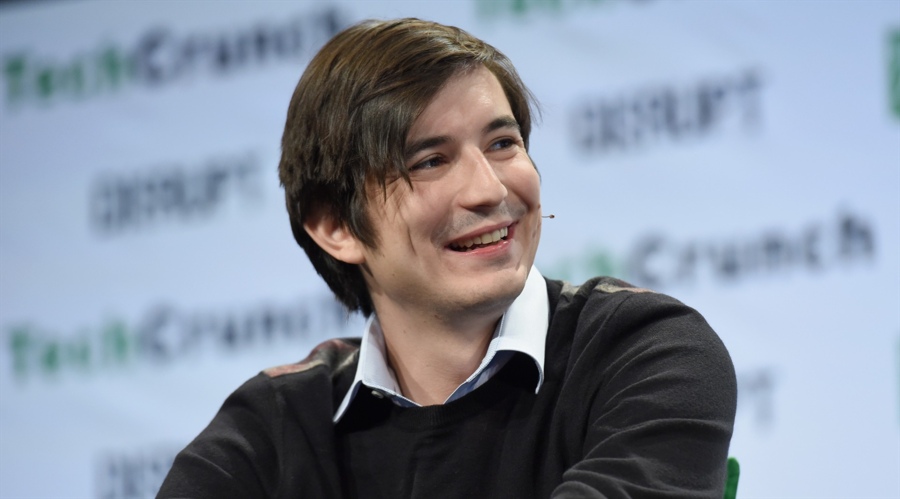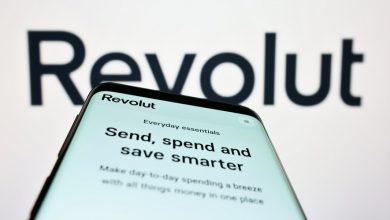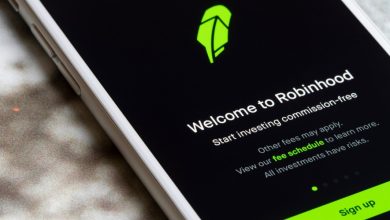Robinhood CEO Reveals: “I Was Never Really Doing It for the Money”

Robinhood Markets (NASDAQ: HOOD) CEO Vlad Tenev built a $90 billion financial empire, but wealth was never the driving force behind his mission to upend traditional Wall Street gatekeepers.
“When I started the company, I was worth nothing,” Tenev said during a Bloomberg Wealth interview. “But things haven’t changed very much for me, as it might be a little bit surprising because I was never really doing it for the money.”
The Bulgarian immigrant’s journey from aspiring mathematician to fintech disruptor reveals how Silicon Valley’s “get customers first, monetize later” playbook transformed an entire industry. Today, Robinhood operates nine separate revenue streams generating more than $100 million each annually.
From Academic Dreams to Trading Floor Reality
Tenev’s path to financial services started with failure. He and Co-Founder Baiju Bhatt launched their first venture as a hedge fund focused on proprietary trading immediately after graduate school.
“It didn’t ultimately succeed. It was sort of like a fairly quick failure,” Tenev admitted. The 2008 financial crisis, which began during his first month in UCLA’s mathematics PhD program, provided the catalyst for their pivot.
“My Co-Founder, Biju, found a job at an algorithmic trading firm. And the first month that I was in graduate school in his first month at this algorithmic trading firm, 2008 financial crisis began,” Tenev recalled. “So Lehman Brothers went belly up, stock market crashed.”
That crisis sparked an insight about technology’s potential to democratize trading. Watching institutional clients trade billions through automated systems maintained by just “a handful of software engineers,” Tenev wondered why retail investors couldn’t access the same efficiency.
Robinhood’s Commission-Free Revolution
Robinhood’s zero-commission model forced every major brokerage to eliminate trading fees, fundamentally reshaping the industry. But Tenev dismisses the idea that his company pioneered commission-free trading.
“I think that a lot of people talked about zero commissions being the future, and there were some startups that didn’t really work out that tried zero commissions. On a more promotional basis,” he said. “But certainly the industry moved to zero commissions as a result of robinhood’s impact.”
The company’s early strategy borrowed from Silicon Valley’s biggest success stories. “Instagram, Uber, you know, Medha, formerly Facebook at that time, and the playbook was, why don’t we just get customers?” Tenev explained.
Their thesis proved correct. Starting with angel investors writing $5,000 checks pitched with the same intensity as presentations to top-tier venture firms, early backers who “still holding on” have seen extraordinary returns on their initial investments.
Building the Financial Super App
Today’s Robinhood spans far beyond stock trading. The platform encompasses brokerage services, derivatives trading through futures commission merchant operations, cryptocurrency exchange capabilities, banking products, and credit cards.
“At the highest level, we have a couple of large businesses,” Tenev said, describing the company’s structure. Recent acquisitions include registered investment advisory platform Trade PMR and cryptocurrency exchange Bitstamp, which adds institutional capabilities.
The diversification strategy has made the business more resilient to market cycles. During 2022’s challenging period for growth stocks, Robinhood’s expanded offerings helped weather volatility.
“We have Robinhood Gold, our subscription offering, we offer high interest which allows customers and us to benefit from increased rates,” Tenev noted. “We’ve done really, really well on the active trader side. Growing market share and active traders actually do tend to be more resilient.”
The Private Markets Problem
Despite his success in democratizing public markets, Tenev identifies a major remaining barrier for retail investors: access to private companies where most significant returns now occur.
“A big tragedy is that private markets are where the bulk of the interesting appreciation and exposure is nowadays,” he said. “If you want early exposure or even medium to late stage exposure as a retail investor, you’re largely shut out.”
The shift represents a fundamental change from earlier eras when technology companies went public at lower valuations, providing massive growth opportunities for retail investors. Now companies often reach hundreds of billions in private market valuations before going public.
“In the days of a technology company going public at a valuation of hundreds of billions and then giving you a thousand or 10,000 x return in the public markets are getting increasingly more and more rare,” Tenev explained.
Tokenization Technology as Market Solution
Robinhood is positioning blockchain-based tokenization as the solution to private market access barriers. The technology converts real-world assets into digital tokens that can trade continuously on global markets.
The company has already launched tokenized stock products in Europe and piloted private company tokens for SpaceX and OpenAI, demonstrating how traditionally illiquid investments could become accessible to retail investors.
Tenev believes this represents the most significant capital markets innovation in over a decade, potentially transforming how everything from private equity to real estate changes hands in financial markets.
— Robinhood EU (@RobinhoodApp_EU) June 30, 2025
AI Without Replacement
While co-founding AI mathematics lab Harmonic alongside running Robinhood, Tenev maintains a measured view of artificial intelligence’s role in finance. The company, which recently raised Series B funding led by Kleiner Perkins, focuses on building “mathematical superintelligence.”
“I think that every company will become an AI company, but that will happen at an even more accelerated rate,” he predicted. However, he rejects the notion that AI will replace human decision-making in financial planning.
“I don’t think there’s going to be a future where AI just does all of your thinking, all of your financial planning, all the strategizing for you,” Tenev said. “It’ll be a helpful assistant to a trader and also to your broader financial life. But I think the humans will ultimately be calling the shots.”
The Founder’s Paradox
Tenev’s approach to wealth contradicts traditional investment wisdom about diversification. While financial advisors typically recommend spreading risk across multiple assets, successful founders often do the opposite.
“The traditional investment advice is to make sure you’re diversified and that you have a well-balanced, diversified portfolio,” he acknowledged. “And I think that’s interesting because nobody wants you to be diversified as a founder.”
“The shareholders don’t want you to be diversified. They want you maximally exposed, in fact, to the one asset you’re watching,” Tenev explained. “So it’s much more of put all of your eggs in one basket and watch that basket very, very carefully.”
His personal wealth has experienced dramatic swings alongside Robinhood’s stock price, from billions at the 2021 IPO peak to significant declines and recent recovery. Through it all, his motivation remains unchanged.
“My motivation is creating new things. If you create new things that are more useful and become the standard, that’s really what gets me excited,” Tenev said.
Robinhood Markets (NASDAQ: HOOD) CEO Vlad Tenev built a $90 billion financial empire, but wealth was never the driving force behind his mission to upend traditional Wall Street gatekeepers.
“When I started the company, I was worth nothing,” Tenev said during a Bloomberg Wealth interview. “But things haven’t changed very much for me, as it might be a little bit surprising because I was never really doing it for the money.”
The Bulgarian immigrant’s journey from aspiring mathematician to fintech disruptor reveals how Silicon Valley’s “get customers first, monetize later” playbook transformed an entire industry. Today, Robinhood operates nine separate revenue streams generating more than $100 million each annually.
From Academic Dreams to Trading Floor Reality
Tenev’s path to financial services started with failure. He and Co-Founder Baiju Bhatt launched their first venture as a hedge fund focused on proprietary trading immediately after graduate school.
“It didn’t ultimately succeed. It was sort of like a fairly quick failure,” Tenev admitted. The 2008 financial crisis, which began during his first month in UCLA’s mathematics PhD program, provided the catalyst for their pivot.
“My Co-Founder, Biju, found a job at an algorithmic trading firm. And the first month that I was in graduate school in his first month at this algorithmic trading firm, 2008 financial crisis began,” Tenev recalled. “So Lehman Brothers went belly up, stock market crashed.”
That crisis sparked an insight about technology’s potential to democratize trading. Watching institutional clients trade billions through automated systems maintained by just “a handful of software engineers,” Tenev wondered why retail investors couldn’t access the same efficiency.
Robinhood’s Commission-Free Revolution
Robinhood’s zero-commission model forced every major brokerage to eliminate trading fees, fundamentally reshaping the industry. But Tenev dismisses the idea that his company pioneered commission-free trading.
“I think that a lot of people talked about zero commissions being the future, and there were some startups that didn’t really work out that tried zero commissions. On a more promotional basis,” he said. “But certainly the industry moved to zero commissions as a result of robinhood’s impact.”
The company’s early strategy borrowed from Silicon Valley’s biggest success stories. “Instagram, Uber, you know, Medha, formerly Facebook at that time, and the playbook was, why don’t we just get customers?” Tenev explained.
Their thesis proved correct. Starting with angel investors writing $5,000 checks pitched with the same intensity as presentations to top-tier venture firms, early backers who “still holding on” have seen extraordinary returns on their initial investments.
Building the Financial Super App
Today’s Robinhood spans far beyond stock trading. The platform encompasses brokerage services, derivatives trading through futures commission merchant operations, cryptocurrency exchange capabilities, banking products, and credit cards.
“At the highest level, we have a couple of large businesses,” Tenev said, describing the company’s structure. Recent acquisitions include registered investment advisory platform Trade PMR and cryptocurrency exchange Bitstamp, which adds institutional capabilities.
The diversification strategy has made the business more resilient to market cycles. During 2022’s challenging period for growth stocks, Robinhood’s expanded offerings helped weather volatility.
“We have Robinhood Gold, our subscription offering, we offer high interest which allows customers and us to benefit from increased rates,” Tenev noted. “We’ve done really, really well on the active trader side. Growing market share and active traders actually do tend to be more resilient.”
The Private Markets Problem
Despite his success in democratizing public markets, Tenev identifies a major remaining barrier for retail investors: access to private companies where most significant returns now occur.
“A big tragedy is that private markets are where the bulk of the interesting appreciation and exposure is nowadays,” he said. “If you want early exposure or even medium to late stage exposure as a retail investor, you’re largely shut out.”
The shift represents a fundamental change from earlier eras when technology companies went public at lower valuations, providing massive growth opportunities for retail investors. Now companies often reach hundreds of billions in private market valuations before going public.
“In the days of a technology company going public at a valuation of hundreds of billions and then giving you a thousand or 10,000 x return in the public markets are getting increasingly more and more rare,” Tenev explained.
Tokenization Technology as Market Solution
Robinhood is positioning blockchain-based tokenization as the solution to private market access barriers. The technology converts real-world assets into digital tokens that can trade continuously on global markets.
The company has already launched tokenized stock products in Europe and piloted private company tokens for SpaceX and OpenAI, demonstrating how traditionally illiquid investments could become accessible to retail investors.
Tenev believes this represents the most significant capital markets innovation in over a decade, potentially transforming how everything from private equity to real estate changes hands in financial markets.
— Robinhood EU (@RobinhoodApp_EU) June 30, 2025
AI Without Replacement
While co-founding AI mathematics lab Harmonic alongside running Robinhood, Tenev maintains a measured view of artificial intelligence’s role in finance. The company, which recently raised Series B funding led by Kleiner Perkins, focuses on building “mathematical superintelligence.”
“I think that every company will become an AI company, but that will happen at an even more accelerated rate,” he predicted. However, he rejects the notion that AI will replace human decision-making in financial planning.
“I don’t think there’s going to be a future where AI just does all of your thinking, all of your financial planning, all the strategizing for you,” Tenev said. “It’ll be a helpful assistant to a trader and also to your broader financial life. But I think the humans will ultimately be calling the shots.”
The Founder’s Paradox
Tenev’s approach to wealth contradicts traditional investment wisdom about diversification. While financial advisors typically recommend spreading risk across multiple assets, successful founders often do the opposite.
“The traditional investment advice is to make sure you’re diversified and that you have a well-balanced, diversified portfolio,” he acknowledged. “And I think that’s interesting because nobody wants you to be diversified as a founder.”
“The shareholders don’t want you to be diversified. They want you maximally exposed, in fact, to the one asset you’re watching,” Tenev explained. “So it’s much more of put all of your eggs in one basket and watch that basket very, very carefully.”
His personal wealth has experienced dramatic swings alongside Robinhood’s stock price, from billions at the 2021 IPO peak to significant declines and recent recovery. Through it all, his motivation remains unchanged.
“My motivation is creating new things. If you create new things that are more useful and become the standard, that’s really what gets me excited,” Tenev said.



